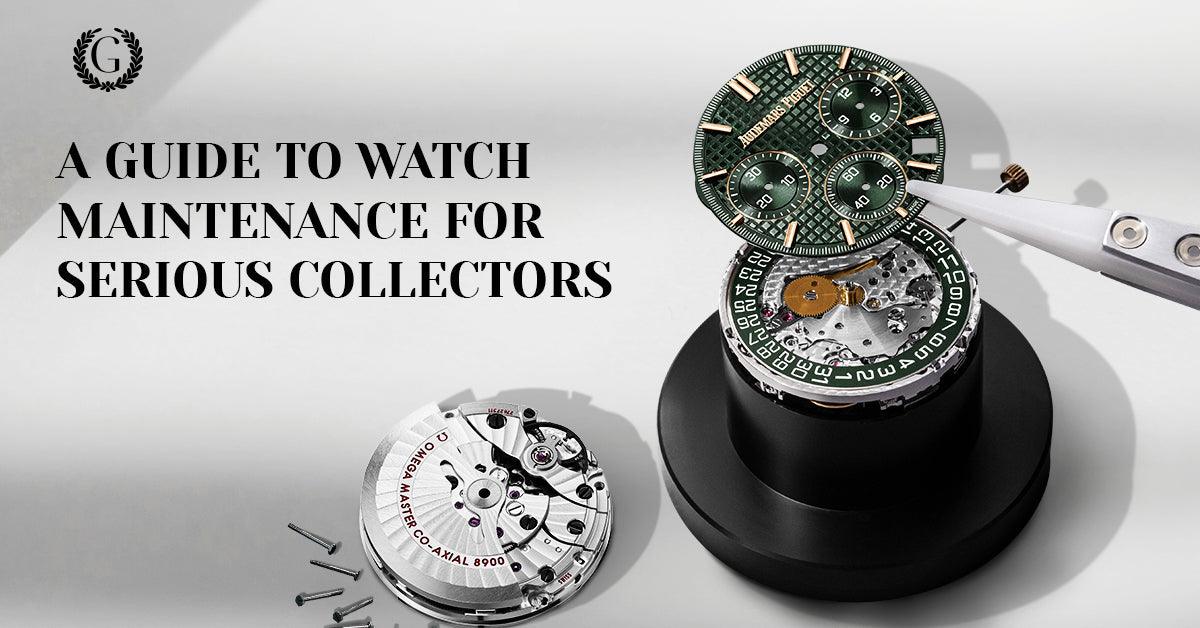Welcome to Gotham Trading! As a serious watch collector, you understand the significance of investing in high-quality timepieces. Proper maintenance is crucial to ensure that your watches stand the test of time & maintain their exceptional performance & value.
This comprehensive guide will delve into the essential tips & practices that will help you keep your timepieces in top condition.
By following these guidelines, you can extend the lifespan of your watches & enjoy their timeless elegance for years to come.
Table of Contents:
-
Why Watch Maintenance Matters
-
Daily Care & Maintenance
-
Regular Servicing & Cleaning
-
Waterproof Watches: Handling Water Exposure
-
Straps & Bracelets: Maintenance Tips
-
Storing & Protecting Your Watches
-
Handling Vintage & Complicated Watches
1. Why Watch Maintenance Matters?
To fully appreciate the significance of watch maintenance, it's important to understand the intricate mechanisms & delicate craftsmanship that go into creating these timepieces.
Regular maintenance ensures accurate timekeeping and preserves the aesthetic appeal & longevity of your watches.
Neglecting maintenance can lead to inaccurate timekeeping, decreased water resistance, or damage to delicate components.
2. Daily Care & Maintenance
To keep your timepieces in top condition, follow these daily care & maintenance practices:
- Wiping: Use a soft, lint-free cloth to wipe your watch regularly to remove fingerprints, dust & moisture.
- Avoid Magnets: Keep your watch away from strong magnetic fields, as they can disrupt their accuracy.
- Avoid Extreme Temperatures: High temperatures can affect the lubricants & cause damage, while extreme cold can reduce battery life.
- Prevent Scratches: Be mindful of your watch's surroundings to prevent accidental scratches. Avoid contact with rough surfaces.
- Manual-Winding Watches: If you own manual-winding watches, wind them simultaneously daily to maintain accuracy.
- Automatic Watches: If you have automatic watches, wear them regularly or use watch winders to keep the movement running smoothly.
- Battery-Powered Watches: For battery-powered watches, replace the battery as soon as it runs out to avoid leakage & potential damage.
3. Regular Servicing & Cleaning
Regular servicing & cleaning are vital for maintaining the performance & longevity of your watches. Consider the following tips:
- Recommended Servicing Intervals: Follow the manufacturer's recommendations for servicing intervals. Typically, a watch should be serviced every 3-5 years.
- Professional Servicing: Entrust your valuable timepieces to certified watchmakers or authorized service centers for servicing & repairs.
- Movement Cleaning: During servicing, the watch is disassembled, cleaned, lubricated & reassembled to ensure optimal performance.
- Gasket Replacement: Water-resistant should replace gaskets regularly to maintain water resistance.
- Crystal Care: If your watch has an acrylic crystal, it is prone to scratches. Polishing it periodically can help restore its clarity.
- Metal Bracelets: Clean metal bracelets with warm water, mild soap & a soft brush. Rinse thoroughly & dry before wearing.
- Leather Straps: Leather straps should be cleaned with a soft, damp cloth & allowed to dry naturally. Avoid excessive exposure to water.
Waterproof Watches: Handling Water Exposure
Water-resistant watches require additional care to maintain their water resistance. Here are some essential tips:
- Know The Water Resistance Rating: Understand the water resistance rating of your watch & its limitations. Not all watches are suitable for swimming or diving.
- Water Resistance Testing: Periodically test the water resistance of your watch using professional equipment. This ensures that the seals are intact.
- Avoid Rapid Temperature Changes: Sudden changes can cause condensation inside the watch. Avoid exposing your watch to hot water or saunas.
- Rinse After Saltwater Exposure: If your watch comes into contact with salt water, rinse it with fresh water to remove any salt residue that can damage the watch.
- Check Crowns & Pushers: Ensure that the crowns & pushers are screwed down properly before exposing your watch to water.
Straps & Bracelets: Maintenance Tips
Proper care & maintenance of watch straps & bracelets are essential to longevity. Consider the following tips:
- Strap Rotation: If you have multiple watches, rotate their straps regularly to prevent excessive wear on a single strap.
- Leather Strap Care: Apply a leather conditioner periodically to keep the strap supple & moisturized. Avoid contact with water.
- Metal Bracelet Care: Remove metal bracelets periodically & clean them with a soft brush & soapy water. Rinse thoroughly & dry before reattaching.
- Rubber & Fabric Straps: Clean rubber or fabric straps with mild soap & water, allowing them to air dry.
Storing & Protecting Your Watches
Proper storage is crucial to protect your watches when they are not in use. Follow these guidelines:
- Watch Box or Case: Store your watches in a dedicated box or case to protect them from dust, moisture & accidental damage.
- Avoid Sunlight: Prolonged exposure to direct sunlight can fade dials, damage straps & affect lubricants. Store your watches away from sunlight.
- Travel Cases: Use dedicated travel cases or watch rolls to protect your watches from scratches or impacts.
- Watch Winders: If you have automatic watches, consider using watch winders to keep them running when not in use. This helps maintain the accuracy of the timekeeping.
Handling Vintage & Complicated Watches
Vintage & complicated watches require specialized care. Here are a few additional tips to consider:
- Vintage Watches: Regular servicing is essential for vintage watches, as they may have delicate components & require extra attention.
- Complicated Watches: If you own watches with complications like chronographs or perpetual calendars, familiarize yourself with their specific maintenance requirements & consult a qualified watchmaker for servicing.
- Antique Timepieces: Antique watches should be handled with care. Avoid exposing them to extreme conditions & limit their use to special occasions.
Conclusion
As a serious watch collector, you must carefully maintain your timepieces. Following the essential maintenance tips & practices outlined in this guide, you can ensure that your watches remain in top condition, retaining their value & exquisite beauty for years.
Remember, regular servicing, daily care & proper storage are key to preserving the longevity & performance of your watches.
Enjoy your collection & savor the timeless elegance of your Gotham Trading!
For A Precious Watch Piece That Lasts A Lifetime, Trust Only The Pros At Gotham Trading
A good understanding of watch maintenance & taking the necessary care is critical for serious watch collectors. Gotham Trading can provide everything an experienced collector needs to properly handle watches - from daily cleaning & inspections to specialized care. On top of that, we are committed to providing superior service at competitive prices.
Whether you're looking for a certified pre-owned vintage watch or need an expert opinion on the condition of your timepiece, Gotham Trading is the #1 choice for discerning collectors.
With our team of professional watchmakers & jewelry designers, we can ensure that your watches remain in excellent condition for many years to come.
Don't wait - take advantage of our experience & expertise today!
Top Frequently Asked Questions
Q1: How Often Should I Service My Watch?
It is generally recommended to service a watch every 3-5 years. However, specific recommendations may vary depending on the manufacturer & the type of watch.
Q2: Can I Clean My Watch With Water?
It depends on the water resistance rating of your watch. Generally, it is safe to clean metal bracelets with mild soap & water. Still, leather straps should avoid excessive exposure to water.
Q3: Can I Wear My Water-Resistant Watch While Swimming?
Water resistance ratings vary, so checking your watch's specifications is essential. Not all water-resistant watches are suitable for swimming or diving.
Q4: How Can I Prevent Scratches On My Watch?
Be mindful of your watch's surroundings & avoid contact with rough surfaces. Additionally, consider using protective covers or guards when engaging in activities that may expose your watch to potential scratches.
Q5: Should I Wind My Automatic Watch If I'm Not Wearing It?
If you have an automatic watch, wearing it regularly or using a watch winder when it's not worn can help keep the movement running smoothly & maintain accurate timekeeping.
Q6: How Can I Protect My Watch From Sunlight Damage?
Prolonged exposure to direct sunlight can fade dials, damage straps, & affect lubricants. It's best to store your watches away from sunlight in a dedicated watch box or case.
Q7: Can I Use Any Cleaning Agents On My Watch?
It is generally recommended to use mild soap, lukewarm water & a soft brush to clean metal bracelets. However, it's important to follow the manufacturer's instructions or consult a professional for specific materials like leather, rubber, or fabric.
Q8: How Can I Check The Water Resistance Of My Watch?
It is recommended to have the water-resistance of your watch tested by professionals using specialized equipment. They can verify if the seals are intact & ensure the watch's water resistance.
Q9: Should I Service My Vintage Watch More Frequently?
Vintage watches often require frequent servicing due to their age & delicate components. It's advisable to consult a qualified watchmaker for specific recommendations based on the watch's condition & age.
Q10: Can I Store My Watches In A Regular Drawer Or Box?
It's best to store your watches in a dedicated watch box or case to protect them from dust, moisture & accidental damage. These boxes provide a suitable environment for maintaining the watches' condition & longevity.



